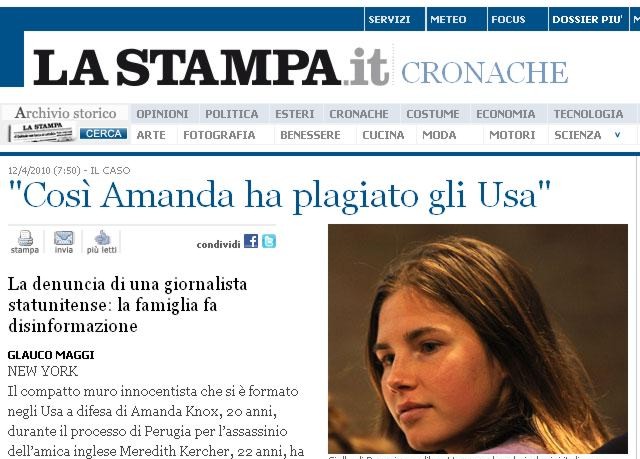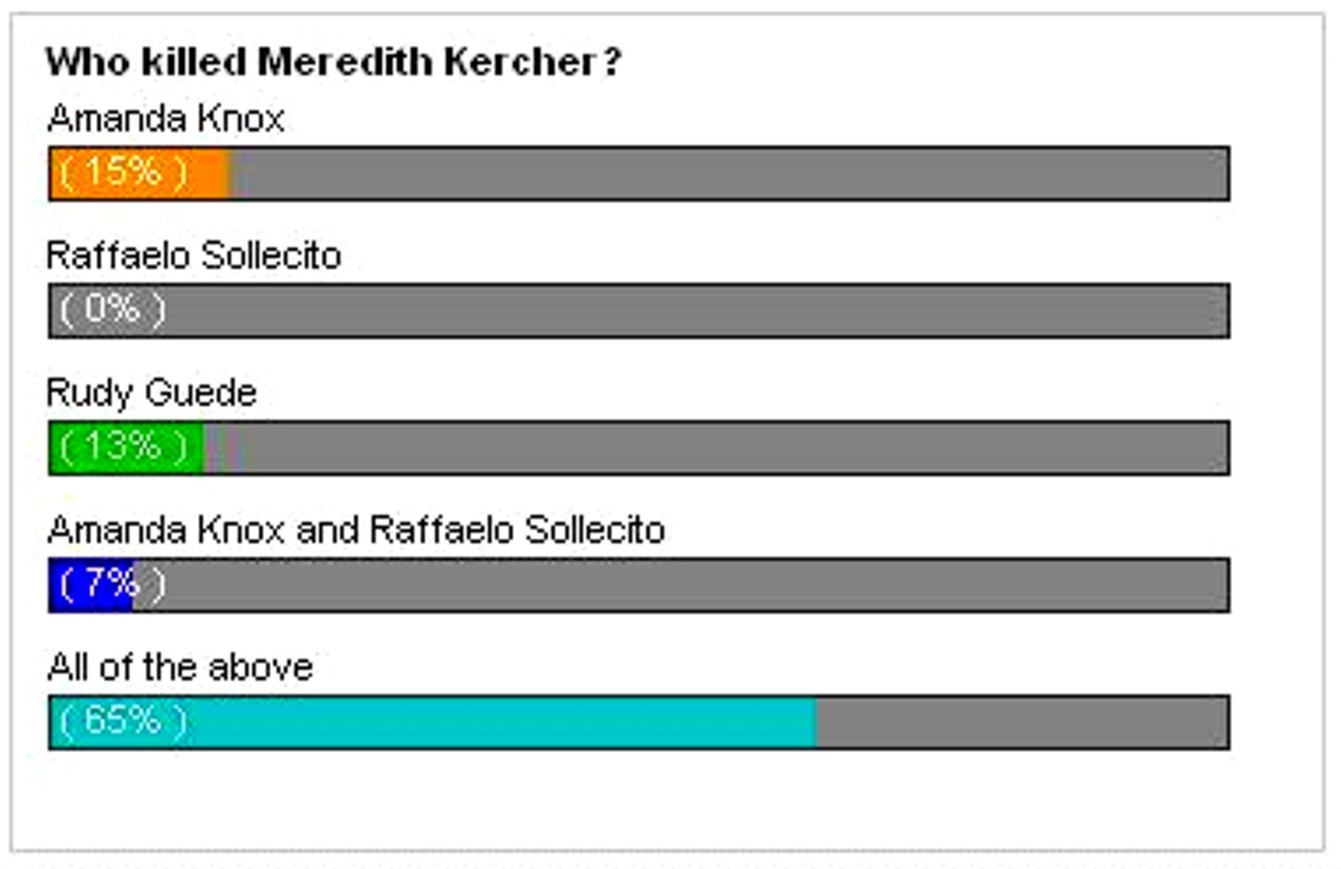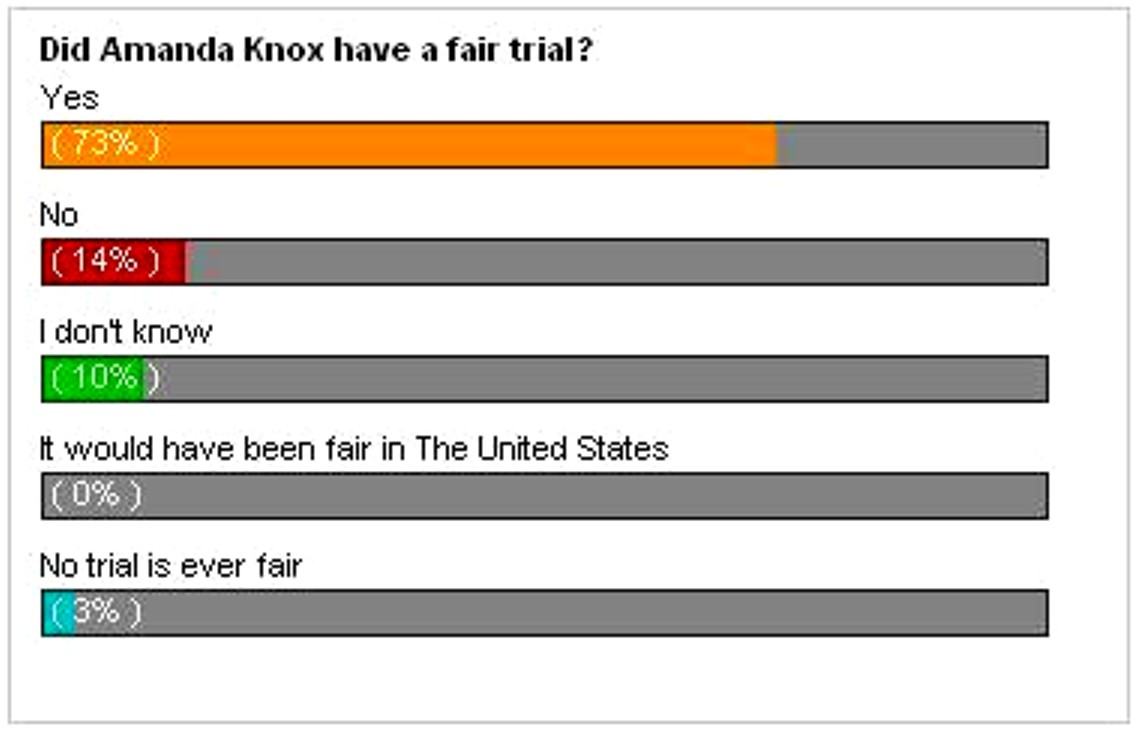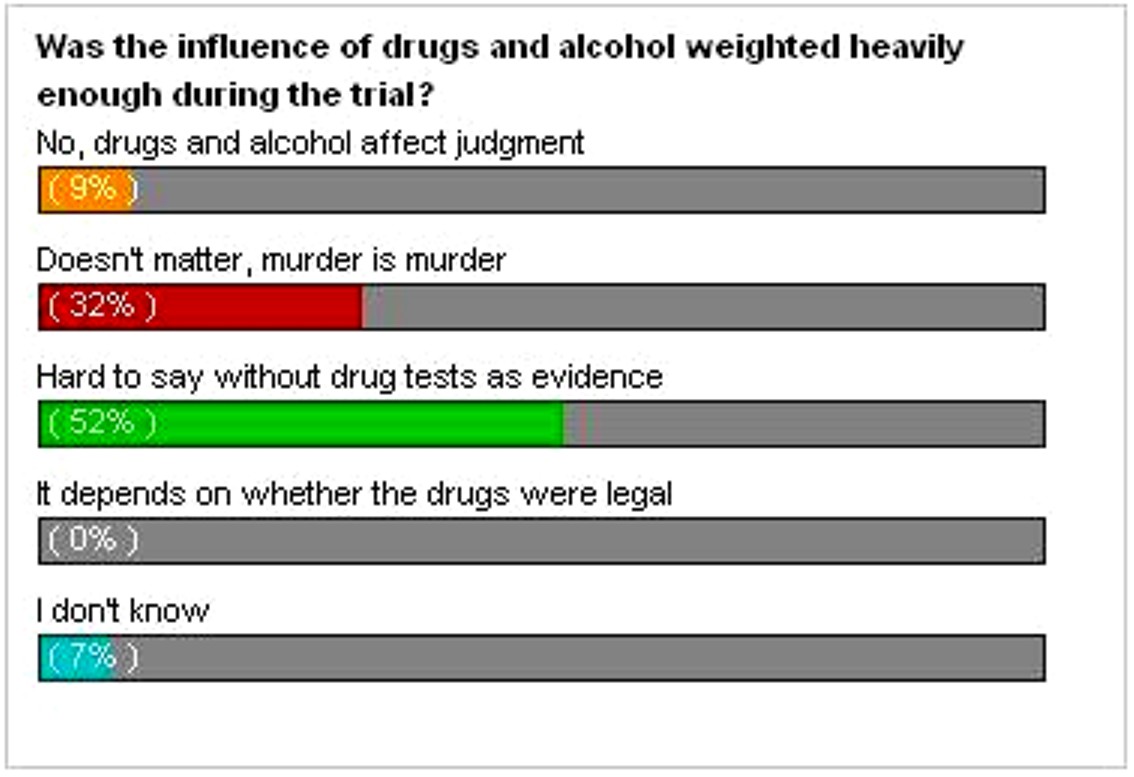
Headsup: Disney's Hulu - mafia tool?! First warning already sent to the Knox series production team about the hoaxes and mafia connections. The Daily Beast's badly duped Grace Harrington calls it "the true story of Knox’s wrongful conviction of the murder of her roommate". Harrington should google "rocco sollecito" for why Italians hesitate to talk freely.
Tuesday, May 04, 2010
From The Book Darkness Descending: The Insights On Rudy Guede
Posted by Peter Quennell
Above and just below: Abidjan, the very attractive West African city where Rudy Guede was born and where he lived until he was five.
Darkness Descending includes this well-researched and revealing portrait below of Rudy Guede and the two traumatic experiences that really threw him: his moving in with the Caporali family, and the collapse of the restaurant in northern Italy which briefly employed him.
No claims here about Rudy Guede being a drifter or drug-dealer or dangerous knife-wielder or petty criminal.
None of those things are confirmed by the record or the Micheli report, and few or none in Perugia or Italy generally seem to believe Rudy Guede was the sole perpetrator or even the main perpetrator of Meredith’s death.

(Above: the downtown of Abidjan, the economic and former political capital of the Ivory Coast)
From Darkness Descending by Paul Russell and Graham Johnson (Pocket Books) pages 292 to 296
Unlike Amanda and Raffaele, the background of Rudy Hermann Guede seemed to inspire a degree of sympathy in readers and viewers.
At least once the undercurrents of reactionary racism had run its course and readers were able to identify with Guede the individual.
Guede had been dragged up a virtual orphan. He seemed to be luckless, directionless, prone to following others into trouble, his carers said. He’d never had a paternal figure to look up to or guide him.
That, and the fact that once he’d been caught he seemed to be at least trying to tell the truth about his involvement with Meredith, gave him a certain credibility.
He was often given a fair hearing in the papers for not trying to evade guilt by changing his story. Editors and readers seemed to appreciate that he had not relied on high-powered family connections to duck out of one of the most tragic cases that had ever come before them.

(From Piazza Italia at the south end of the walled city - Rudy Guede first lived off there to the south-east)
Guede came to Italy in 1992, when he was five years old. His father Roger had emigrated from the Ivory Coast a few years before at a time when the Italian economy needed new manpower to fuel the country’s post-industrial boom…
Roger Guede had trained as a teacher in the former capital city of the Ivory Coast, Abidjan, where his wife still lived with little Rudy, but in Italy he found work as a bricklayer.
Life was hard because of exploitation, denial of workers’ basic rights and rampant illegal labour.
After five years he was granted a regular resident’s permit and returned to Abidjan to his wife, to see if he could take the young Rudy back to Italy with him. She agreed that in Italy he would have a chance of a better life.
Roger and Rudy found a flat in the shabby low-lying suburb of Perugia called Ponte San Giovanni. The neighbourhood was not at the top of the hill, with its wide vistas, ancient buildings and air of academia.
Roger’s life had no room for aspiration or fanciful gap-year adventures. He settled for a seedy new-build on the valley floor near the railway station. An unhealthy stream meandered through the projects like a sewer.
Still, it was better than the shanty town where Rudy’s mother was eking out a bare existence.
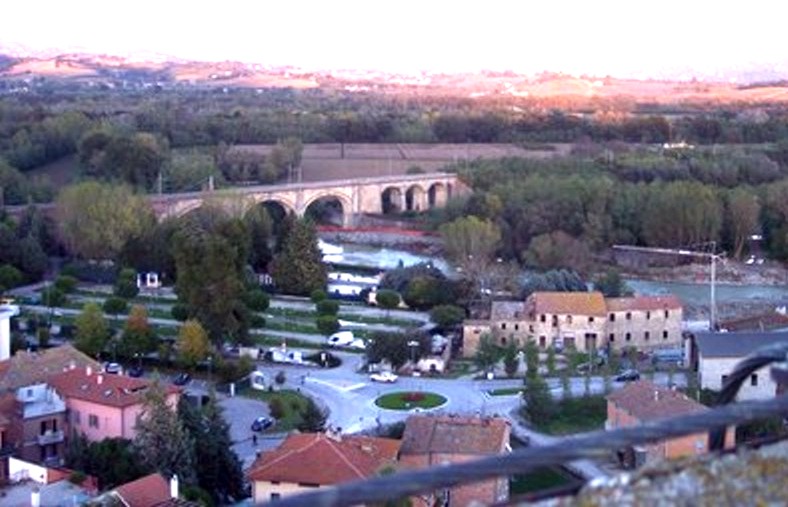
[Shots here and just below of Ponte San Giovanni, the town just to the east where Guede first lived]
New to immigration, Italy’s attitude to race relations has often been schizophrenic. Far-right extremists have been known to whip up dissension. But in Perugia, a small community like many that made up the backbone of Italian society, Roger and his son were welcomed.
His presence stimulated the lively cutiosity of Italians, not their hostility. The kindness of his neighbours and the willingness of social services to offer him childcare were proof of that, and he was free to hit the road to find building-site work.
During these absences Rudy was fostered by local families. One of his first full-time carers was a Mrs Mancini, who had been his maths teacher at school. She never lost interest in him and was to be like a second mother.
Rudy also struck up a lifelong friendship with her son Gabriele and another schoolmate, Giacomo Benedetti. The fabric of a closeknit Italian working-class community felt like a protective cloak and Rudy thrived.
His teachers and foster families all say that he was a quiet child, well behaved and responsible. He had moments of daydreaming stupidity, but no more than other kids.
He was good at basketball - tall, athletic and serious. The local professional basketball team was sponsored by one of Italy’s most successful companies, Liomatic, who manufactured coffee dispensers - a link that would later change the course of his life.
One day, Rudy’s dad went home to Abidjan to renew his passport, but civil war broke out when he was in the country and instead of spending two weeks away from his son he was trapped for six months, as strife raged in the Ivory Coast.
Back in Italy, the social services stepped in with a view to formalizing Rudy’s foster status and finding a long-term home for him.
Rudy was unhappy but he coped with the loneliness and uncertainty with admirable courage. He didn’t complain. And he was soon rewarded. Astonishingly, he was catapulted into the heart of one of Italy’s richest families.
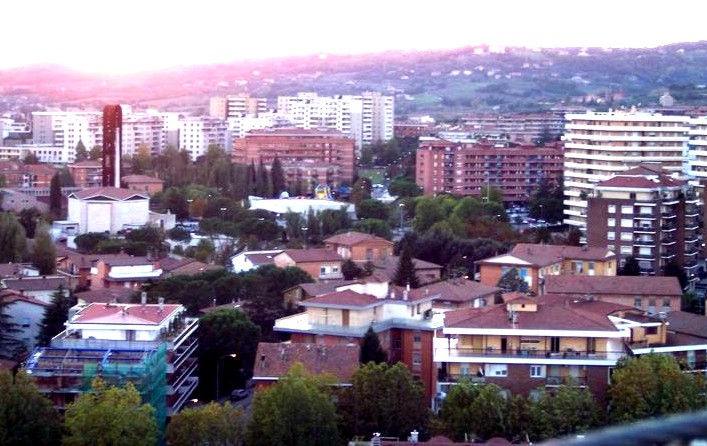
[Another shot of Ponte San Giovanni, where Guede in his early days apparently lived happily]
His change of fortune was like something out of the plot of the musical Annie. Rudy had met one of the Caporali sons at basketball. Now the family wanted to officially take him in as one of their own. He never lived with Roger again.
The change wasn’t smooth. Rudy found it difficult to adapt. When he moved out of Ponte San Giovanni, he lost touch with many of his old friends, which he found particularly hard.
They had been the bedrock in what had so far been a rather unstable family life. He soon missed the informality, the lack of pressure to succeed and the maternal bonds that Italian families are famous for.
It wasn’t long before his new father figure, Paolo Caporali, was calling Rudy ‘an inveterate liar’. He skipped school and spent his time in front of the television or on PlayStation. Caporali’s wife and kids were much kinder in their view:
Rudy was introverted and shy. He lied to protect himself, but not maliciously to hurt others or gain personal advantage.
The move from a poor area to the home of the super-rich Caporali family had confused Rudy and, to some degree, had embarrassed him.
His basketball trainer Roberto Segolini said Rudy was friends with everyone and never missed a training session. Where he could prove his worth and show success to his new high-status family, Rudy thrived.
With such a chequered school career, Rudy would find it hard to find a job that suited him once he left school. But at the age of nineteen he went to stay with an aunt in Lecco and landed a job as a waiter in Pavia.
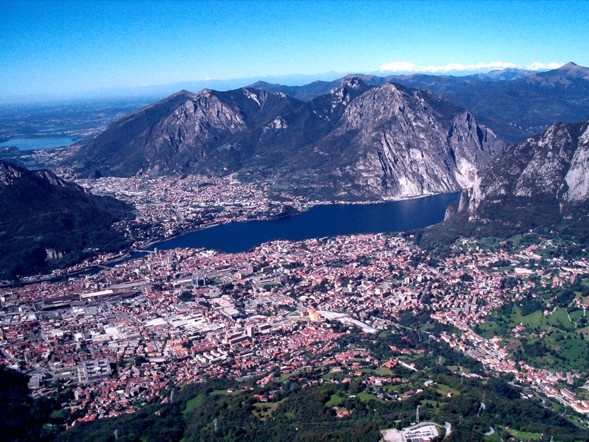
[Shot of Lecco north of Milan where at age 19 Rudy Guede moved to live with an aunt]
Finally, he had found his way. He was ecstatic. He was now going to prove that he could knuckle down and stand on his own two feet. He thought about learning the trade and one day opening a restaurant.
But as soon as he settled in, the rug was pulled from under him - his employer was arrested and the business folded.
To someone with a fragile view of himself, this chance setback took on a great and doom-laden significance. Rudy blamed himself and worried about how he would explain his bad luck to the Caporalis.
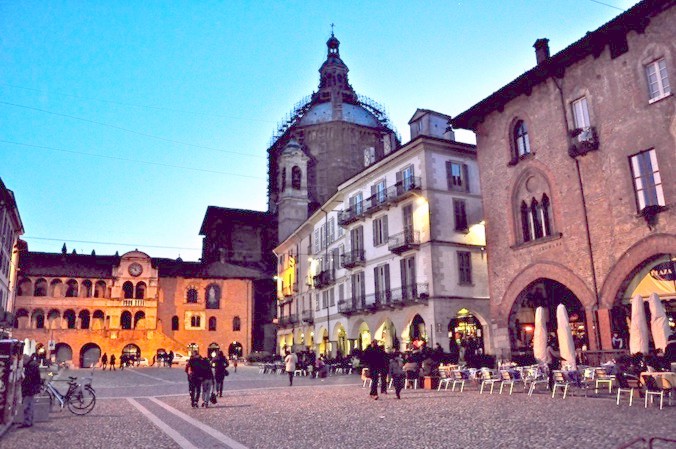
[Shot of Pavia south of Milan where Rudy Guede worked as a waiter till the restaurant collapsed]
Confidence shattered, he fled back to Perugia in shame. It was July 2007 and the beginning of the long summer that would end in tragedy.
The Caporalis were desperate to bolster his self-esteem. In August they found him a gardener’s job at a restaurant they owned out of town.
He stayed with the Mancinis, where the father and mother made sure he got up early to catch the bus. But the rot had set in; he wanted to live where the excitement was.
He was distracted by the scallywag antics of the lads in Perugia, who never seemed to work but always had money, and by the beautiful students from allover the world who were descending on the University to find digs and party.
Amanda and Meredith would be among them. Once he failed to go to work for a whole week, claiming he had flu and snivelling unconvincingly over the phone. He was sacked.
He lived off his savings until 2 November, when the murder and his doomed getaway would end any hopes he had of turning his life around.
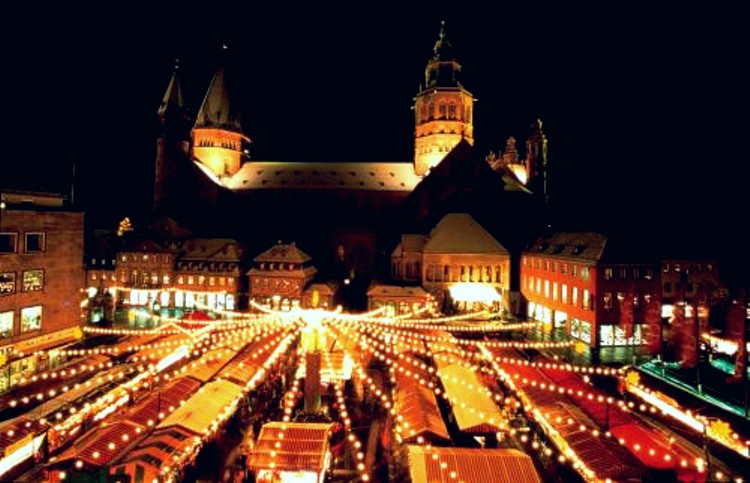
[Shot of Mainz on the Rhine between Frankfurt and Bonn where Rudy Guede was captured]
Monday, May 03, 2010
From The Book Darkness Descending: The Insights On Knox And Sollecito
Posted by Peter Quennell
This is Hamburg above. And that is Berlin and its parliament (the Bundestag) below.
Amanda Knox speaks German and she spent several months in these two cities, staying for some weeks in in Hamburg with her relatives, and several days in Berlin, before moving to Perugia to start her study period there.
Darkness Descending is the book on Meredith’s case by two British writers from which we excerpted on Meredith a few days ago.
As far as we know the writers did not visit Seattle, and their focus is more generally on Italy and to some extent the UK. But they did offer this brief take on Amanda Knox, and also one on Raffaele Sollecito.
**********
From Darkness Descending by Paul Russell and Graham Johnson (Pocket Books) pages 291 and 292
Meredith had enjoyed making the pop video with her University of Leeds friends, but Amanda’s summer job, before travelling around Europe and going to Perugia, had not been so successful.
A politically well-connected uncle in Hamburg had got her an internship to die for - a job working for a German MP at the Bundestag. Kindly Uncle Uwe also set Amanda up with a flat on the .outskirts of Berlin.
Astonishingly, two days later, his seemingly ungrateful niece walked out on the job without telling anyone, moaning that she had nothing to do and she wasn’t sure if she was getting paid. Again, money was a big feature in her thoughts.
She’d spent most of the time reading Harry Potter and showed no curiosity about how the parliament or the high-powered people in there worked. She ignored conversations about its history and architecture.
After walking out, she spent her time drinking wine in the local bars and reading more Harry Potter.
Two days later she left Berlin for Hamburg, where her uncle was waiting for her. He was furious - she had let him down.
It seems Amanda craved excitement on her terms, usually based on getting drunk and goofing around.
Her friends said she simply feared boredom like any young girl. She showed a healthy streak of youthful carelessness, they said, no worse or better than anyone else. A video posted on YouTube showed her drunkenly giggling in a friend’s kitchen after downing shots.
On campus, back in the US, Amanda had been fined for being drunk and disorderly at a party held in a fellow student’s house. During the incident she had also insulted the police.
However, her defenders gave another version, portraying a magnanimous Amanda. They said that in fact she was courageously fronting up for her underage friends, who were in no state to talk to the police; she was the only one sober enough to handle the situation.
A big plus in her character assessment, they said, possibly displaying a sense of chivalry that would later get her into deeper trouble in Perugia.
Despite her college party lifestyle, there was no denying that Amanda was clever and that she could compartmentalize her life.
She made the Dean’s List, an elite commendation of the University of Washington reserved for the institution’s brightest students, and an honour that would ultimately qualify her for a prestigious and sought-after place on the study-abroad exchange programme.
If Amanda wanted something, she would go all out to get it, no messing around.
Raffaele Sollecito’s later years were quite different: he seemed to laze around and evade responsibility.
He posted pictures of himself on the internet wrapped in blood-covered bandages, brandishing a meat cleaver, and wrote a weird story to go with the images. In a blog he expressed satisfaction at once being lodged in the same hostel as the infamous ‘Monster of Foligno’, a murderer who slaughtered two youths in the 1990s.
And yet his new-found fascination with gory horror and violent comics would have surprised the friends he left behind at Licea Scientifico Einstein secondary school at Molfetta.
They said Raffaele suffered from excessive softness - his kickboxing instructor recalled that he even hesitated when kicking out, for fear of hurting the hardened expert.
***********
A few interesting insights there, though we could use more on Sollecito. For most of it, this is a pretty good book, the weak part being the closing analysis of the evidence. Two small corrections.
- The house where the notorious rock-throwing party took place was where Knox herself was living at the time. See here.
- Knox was not on an official University of Washington study-abroad program, as the university has rather anxiously tried to make plain. See here.
If Knox had indeed been on a proper study-abroad program - something many caring parents actually insist upon - her behavior might have been more restrained. She may not have moved in with Sollecito for one thing.
She may not have hit the drugs so hard. And she would not have run so desperately short of money, just when Patrick was apparently about to hire Meredith to replace her. No monthly checks were arriving from Seattle.
Maybe the second correction is not such a small one.
In fact, it is a pity that no writers have really explored all of this - there is, if anything, a surfeit of motives in this case, and the writers might be able to narrow them down.
Although he went to highschool in Molfetta (bottom shot here) and the book is correct on that, Raffaele Sollecito actually comes from Giovinazzo which is ten minutes drive south along the coast.
Both are north of Bari, where his father practices medicine.
Thursday, April 29, 2010
Amazon Reviewers Of New Dempsey Book Don’t Seem Universally Impressed
Posted by Peter Quennell
Click above for the Amazon customer reviews - there are nine reviews right now.
Oddly, the several reviewers that rate the book five stars are all writing their very first Amazon review - and their.language reads suspiciously similar.
In contrast, the reviewers that rate the book only one star seem to be genuine enough - all of them have a previous track-record of Amazon reviews.
So perhaps we could quote from a couple.
*********
By Amazon reviewer Norbert
Public Relations Spin by a Knox Family Acquaintance
Friends and family may appreciate this book for its sympathetic portrayal of convicted killers Amanda Knox and Raffaele Sollecito. Unfortunately, Ms. Dempsey’s bias is so obvious that she lacks all credibility.
Readers interested in truth and justice would be wasting their time here; this book is 100% spin. It constructs a kind of alternate fairy tale universe in which Knox and Sollecito are innocents abroad ... in a “holiday mood” on the morning after the murder.
This imaginary place is full of Italian stereotypes: Raffaele’s proud and loving parents, the bumbling & malevolent police, the paparazzi, the courtroom crucifix, and a demented prosecutor.
Ms. Dempsey’s between-the-lines message: the black guy did it!
Candace Dempsey is a Seattle-based food & travel writer who happens to be acquainted with the Seattle-based Amanda Knox clan. She is essentially a member the Knox defense team. And she’s moved way beyond her pay grade.
With a superficial knowledge of Italian and one or two visits to Perugia, she pretends to be a competent crime reporter.
The intention of the book (aside the profit motive) is to portray Knox as charming innocent abroad - while ignoring or distorting the mountain of evidence and testimony that led to a unanimous first degree murder conviction by an Italian jury on December 4, 2009.
Essentially “Team Knox” is trying to do for Amanda Knox what F. Lee Bailey and Johnnie Cochran did for O. J. Simpson.
*********
By Amazon reviewer Retired Farmer
Blatantly Biased, Shallow, and Inaccurate Version of Events
This book is the third one I have read on the Knox Case, and by far the worst.
The Seattle based author is apparently convinced of Ms Knox’s innocence and makes every effort in this book (and in her Seattle newspaper blog) to bring all readers to the same conclusion.
She does so by deliberately overlooking… irrefutable, obvious facts to the contrary .
Many have reported that Seattle based Ms Dempsey’s Seattle newspaper blog, and now her book pretty much totally conforsm to the media briefings and talking points of the large Seattle based public relations firm that the Knox family employed to publicly paint a favorable impression of Ms Knox and to promote a belief in her innocence here in the US.
This firm tightly controls access to the Knox Family, and very selectively allows very few approved spokespersons to speak with authors and reporters in the US media that the PR Firm works in.
Ms Dempsey apparently believes few of her readers are aware of the PR Firm and their self described ‘sometimes unorthodox’ methods. I say this because she promotes herself and her book by bragging about this Family access.
In fact, many have observed that she has sadly and shamelessly traded her objectivity for this Knox family access.
My suggestion to interested readers is to now obtain a good translation of the Motivations Report written by the Judges.
You will see for yourself the true reasons that Amanda Knox has been unanimously convicted of this horrific murder, as well as the innumerable inaccuracies and blatant bias in Ms Dempsey’s shallow, self serving, erroneous, dry and dreary version of these events.
Finally, IMHO, the PR Firm, their minions and some Seattle zealots have grossly distorted book reviews, ratings, and comments on this site, as well as engaging in some sad school yard name calling.
*********
By Amazon reviewer M C Rogers
Author is a friend of the Knox/Mellas family
Potential readers of this “story” would be well-advised that Ms. Dempsey is a friend of the Knox/Mellas family and approved by the PR firm hired by the Knox/Mellas family. This is hardly an unbiased piece of work.
Throughout the book, self-proclaimed feminist Dempsey refers to Knox and Meredith Kercher as “girls”.
She does her best to portray the victim, Meredith Kercher, as a stuck-up prude, and Ms. Dempsey paints Ms. Kercher’s British friends with the same brush, instead asking us to believe that Amanda Knox and her family somehow knew Ms. Kercher better than even her friends did.
Ms. Dempsey, while all throughout her blog on the subject, decries the tabloids and their treatment of the case, uses quotes from the Daily Mail to make what she must consider overwhelming proof of the family’s PR missive.
Readers have the right to know Ms. Dempsey’s ties to the family of Amanda Knox. For her to not make this connection known is deceptive and portrays Ms. Dempsey’ attempt at serious journalism in a very negative light.
Don’t waste your money. Take that $7.99 and make a donation to an organization that works hard for women who are victims of rape and abuse. RAINN is a good one, as is your local women’s shelter.
Dempsey is a woman who followed the victim’s family around, taking sneaky photographs of them.
Shameless.
Seattle Parks Commissioner Who Angered Perugia Resigns - Amid Plenty Of Anger In Seattle
Posted by Peter Quennell
So the controversial Seattle parks commissioner Tim Gallagher bites the dust.
He seems to have shot himself in, well, three feet.
- He espoused a clearcut-and-rebuild policy (video above) when Seattelites are increasingly seeing the natural beauty of their city as a resource
- He made an expensive trip to Australia to look at some parks just when Seattle’s park system is financially tanking - very likely because of his style of management.
- He was very quick to blink and put a heavy-handed stop to the naming of a small city park “Perugia Park” when Seattle’s (very small) anti-Perugia faction howled.
Mr Gallagher’s last action was widely noted in Perugia (Seatle’s twin city), the Mayor of Perugia made an angry statement, and a Facebook-based movement was created, to lobby to end the twin-city arrangement.
Comments about his short reign as parks commissioner on the West Seattle Blog (scroll down) seem almost uniformly negative.
The Mayor and many others he irritated in Perugia might be pleased to take note…
Tuesday, April 20, 2010
Knox Appeal Points Seem Essentially Points That Gained Limited Traction In The Trial
Posted by Peter Quennell
And the fact that the prosecution will get a shot at firming up their case does seem to have caught the defenses off-balance.
US-based Knox family legal advisor Ted Simon has appeared several times on US networks in the last few days, seemingly clean out of new ideas for how to get Amanda Knox off.
No motive? Well, a motive does not have to be confirmed in Italy, but Micheli, Mignini and Massei all suggested credible motives, each involving an escalation of violence, and each probably involving drugs as one component - drugs like enhanced (skunk) cannabis, crystal meth, and cocaine increasingly seem to be triggering psychotic episodes that can lead to murder.
No DNA in the room? Well, most murders take place with no DNA left behind, and if Knox was the one simply holding the large knife and uttering threats, there is no reason why her DNA should have have deposited. Rudy Guede left only a few microscopic traces of DNA, but clearly he too was in the room. And there was plenty of forensic evidence implicating Knox right outside of Meredith’s door.
And as usual, Ted Simon skirts the very problematic rearrangement of the crime scene, and the testimony of various key witnesses, and the very incriminating pattern of phone calls, and the major discordance between all the alibis.
Pity that the US reporters never ever seem to press him on these things.
And in Perugia, it seems that Mr Ghirga and Mr Della Vedova are also only going through the motions - recycling just a few of their points that were already not too convincing at the trial. Andrea Vogt reported on the grounds for their appeal in the Seattle Post Intelligencer.
The 220-page document filed with the of Court of Appeals in Perugia on Saturday morning is a total appeal of all the points of the sentence, said Knox’s lawyer, Luciano Ghirga from Perugia in an interview with the Seattlepi.com.
“It includes the first days of the interrogation, the DNA and the traces detected with luminol. We re-iterate the innocence of Amanda and remain convinced there is not proof of her presence at the scene of the crime,” Ghirga said….
The hotly contested forensic evidence presented in the trial played an important role in the jury’s reasoning but was not the only element that led them to convict. Inconsistent statements, witness testimony, Knox’s placing the blame on an innocent man, which she maintains she did under police pressure, and the staging of the crime scene were also cited as key factors by the jury.
Knox’s legal teams are expected to contest all points, but are also asking for a third-party review of the forensic evidence. Such a request was rejected once already during the 9-month trial, but a different appeals court judge could decide to grant such an independent review. In Knox’s case, lawyers are contesting the kitchen knife that prosecutors said was the murder weapon that had Knox’s DNA on the handle and a trace amount of Kercher’s on the blade.
Knox’s lawyers also contest the luminol-positive traces discovered in the corridor (footprints) and the spot in the roommates room where prosecutors say Knox and her boyfriend, Raffaele Sollecito, later staged a break-in to make the scene look like a rape-robbery to throw off investigators. Police biologist Patrizia Stefanoni testified during the trial that these luminol-positive traces had mixed genetic material of Knox and Kercher.
Friday, April 16, 2010
Italian Media Reporting Impartially On Prosecution Appeal Filed For Increased Sentences
Posted by Peter Quennell
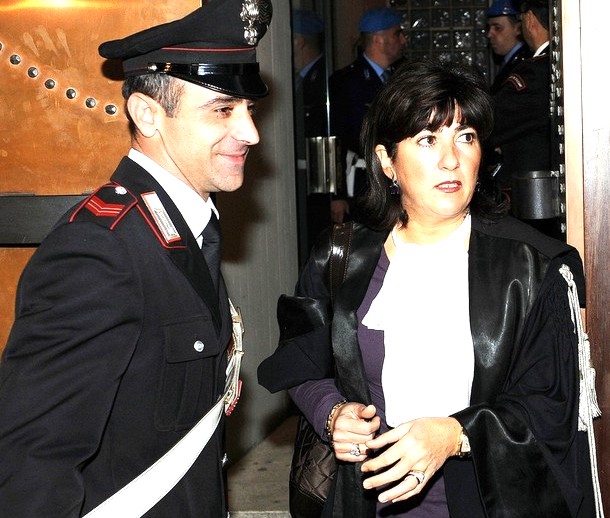
[Above: Prosecutor Manuela Comodi.]
In light of the judges’ sentencing report (due soon here and on PMF in English) the prosecution have filed an appeal that Knox’s and Sollecito’s sentences be revised upward to life.
Life sentences were their original request to the court last November, and the Italian media in November and early December largely anticipated at least 30 years. The 26 years for Knox and 25 for Sollecito came to many as a surprise.
First legal advice from the Italian lawyers on our team is that at minimum this could firm up the existing sentences, and at maximum Knox and Sollecito actually could be looking at life behind bars - such upward revisions do happen.
Remember that the Italian public are way better informed on the cruel depravity of the crime than the British or American publics.
And that Knox’s cold smug antics on the stand, during which she spoke flippantly and callously of Meredith’s passing, seemed to leave few in Italy feeling any real sympathy.
Grounds for the appeal are twofold: (1) That the judges’ arguments for the granting of extenuating circumstances was a stretch (such as the conclusion that the duvet placed over Meredith was a sign of remorse), and (2) That the judges’ dismissing of aggravating circumstances was in effect a shortfall (such as the possibility that Meredith could have been saved if they had not removed her phones, locked the door, and walked off).
The posters here and on PMF may be the largest group in the English-speaking world so far to have actually read the judges’ sentencing report.
Typically we are finding the description of the evidence to be extremely detailed and quite remorseless. There is very, very little room for argument about it, and the defense teams in the appeals will have an even tougher time laying a paw on it than they did in the course of the trial. We are highly impressed by this - this case NEEDED this to put an end to the endless myth-mongering, and to give Meredith’s family and friends hope of some respite.
But the motives assumed in the sentencing report, the judges’ timeline (which differs from both Micheli’s and Mignini’s), and the instigating role given to Rudy Guede, were interpretations the sentencing judges made which the appeals judges may not buy into.
The defense teams will not be resting any easier in light of this. The pressures may be mounting for the lawyers and defendants to finally split three ways - we will have a major post next week on their three-way herding of one another over the past two-plus years.
And perhaps enough pressure on each of the defendants to show real remorse and finally tell their version of all.
Wednesday, April 14, 2010
La Stampa Headline Reads: “This Is The Way That Amanda Subjugated America”
Posted by Tiziano
There’s an excellent review in Italian of “Baby Face” by Glauco Maggi in Italay’s most influential paper, La Stampa. This is the translation.
The Accusation of an American Journalist: the Family Is Spreading Misinformation.
The dense wall of the believers in her innocence, which sprung up in the USA in defence of Amanda Knox, 20 years old, during the trial in Perugia for the murder of her English friend, Meredith Kercher, 22 years old, has been subjected to the first blow from the American side.
In the book Angel Face (Angel Face, the true story of the student killer Amanda Knox), the journalist from Newsweek, Barbie Latza Nadeau, accuses the family of the girl, condemned to 26 years for the voluntary murder, of having created “an innocentista media machine” which has tried to cancel out the heavy body of clues which built up during the trial.
“They have simply chosen to ignore the facts which were coming to light in Italy”, writes Nadeau, who has been the Rome correspondent for Newsweek and other American newspapers since 1996, from the site of the Daily Beast to major television networks (CBS, NBC, Fox and CNN).
The accusations of the journalist are based on her direct experience as a witness, in Italy, of the conduct of the American media. According to Nadeau, access to sources close to Amanda depended on the feelings expressed by the correspondents: the family, essentially, cooperated only with the believers in Amanda’s innocence, to the extent of the payment of travel expenses in exchange for exclusive interviews.
An example of the climate created by the Knox family is the affair of lawyer Joe Tacopina. Having arrived in Perugia as a “legal expert” for the ABC TV channel, at first he played the role of an unofficial of the defender of the interests of the Knoxes. However, when he confided to Nadeau that he could not declare himself to be 100% sure of Amanda’s innocence, having studied the trial documentation, he was excluded from the family circle, which from that moment curled up like a porcupine and actively operated so that their own version would be the only one to reach the USA.
From the moment of the arrest, Nadeau writes, “Amanda and Raffaele were a pushover for the sales of Italian newspapers and of the English tabloids. The local press reported the gossip of the lawyers and the magistrates to liven up the crime story and very soon labelled Amanda as Angel Face, encouraging a morbid fascination.
The British newspapers, ardent in the defence of the English victim’s honour, dug into the details which Amanda had inadvertently put on the Internet, starting from her name on MySpace, Foxy Knoxy. Phone calls to teachers and friends in Seattle provided the description of a studious, intelligent and athletic young girl. But the social networking sites told another story.”
Nadeau unveils the video on YouTube of Amanda drunk at a party, but she strikes the most serious blow to “good girl” when she adds: “Other appearances suggest a more enigmatic and a darker personality. Baby Brother, a film which Amanda had put
on MySpace, is not totally disturbing but contains a rather irresponsible reference to rape.”The investigators took the stories which emerged about her past “as proof that she had at least daydreamed about it, that this was in her mind. Add drugs and alcohol, was their reasoning, and not much was needed for these hidden thoughts would lead to action. The picture was being formed of a shrew who was in thrall of dark impulses and the family struggled to control the storm.” For those who did not accept the reconstructions of the Knoxes as pure gold there was ostracism:
“The TV crews learnt to be careful in letting themselves be seen with people like me, the family would have cut them out of the circle.”
Wednesday, April 07, 2010
The Transcript Of Today’s Online Chat Session With Barbie Nadeau Of The Daily Beast
Posted by Peter Quennell
Lucas Wittmann:
Hi, I’m the Books Editor at The Daily Beast and I’m delighted to welcome Barbie Latza Nadeau and our readers to discuss her new book, Angel Face…
BARBIE LATZA NADEAU:
I’m Barbie Latza Nadeau. Welcome.
[Comment From kcolorado: ]
how was your sense of who she is affected by seeing her in court everyday? Have you spoken with her directly?
BARBIE LATZA NADEAU:
Seeing Amanda Knox walk into the courtroom every day was very important in understanding how she interacted with her lawyers and her family, and in understanding how the jury perceived her. Amanda has not yet given any one-on-one interviews so no, I have not spoken to her directly.
Lucas Wittmann:
Just so you know we see your comments and will publish them live as Barbie is ready so please keep them coming…
[Comment From Kevad: ]
You have also stated in tv coverage that “we still do not really know what happened in that room”, is that how you still feel?
[Comment From stint: ]
Great job with book, Barbie. I really enjoyed it.
BARBIE LATZA NADEAU:
Yes, after over two years following this case, none of us know exactly what happened in Meredith’s bedroom that fateful night. No one has confessed to the crime, so until someone does, we will not have a clear understanding of the exact dynamic of the murder.
[Comment From Guest: ]
How do you think your journalism during the trial affected its outcome?
BARBIE LATZA NADEAU:
Thank you. I’m glad you liked the book. My hope is that it provides perspective of this complex case.
BARBIE LATZA NADEAU:
I don’t think that any of us who covered this trial as journalists had a direct impact on the jury’s decision. We were not in the deliberation room.
[Comment From Wade: ]
Why in your opinion did the seattle media frame the events as they did
BARBIE LATZA NADEAU:
I think that many of my colleagues in the Seattle market did the best job they could with the information they had. Their primary source was the Knox family, so their coverage was affected by that. When members of the Seattle press came to Perugia, they did not speak Italian and had a difficult time following the court sessions because there was no translator. Those of us who live and work here in Italy often helped the American press as best we could.
[Comment From stint: ]
Regarding earlier comment. Since Knox Family PR firm *very* closely controls any and all media contact with themselves, and they have reportedly blackballed any reporters even seen *near* you, do you really think you might interview Amanda in the future
BARBIE LATZA NADEAU:
I have hope that Amanda might want someone objective who understands Italian to conduct an interview with her at some point down the road. But because I have been skeptical, I am fairly sure I am not high on the list of interview candidates.
[Comment From mnh12121887:
But why did the American media take the Knox family version so much on face value without even trying to look deeper?
BARBIE LATZA NADEAU:
I think that the economic crisis has played a role. Many bureaus have been closed across Europe and it would have been a major expense to send a correspondent to Italy for such a long trial. I think that had there been a larger Italian based press corp it would have made a difference in coverage.
Lucas Wittmann:
Let’s explore now the facts of the case.
[Comment From Guest: ]
Do you believe Knox’s assertion that she was abused during her final interrogation?
BARBIE LATZA NADEAU:
I think it depends how you define “abused.” If you mean to ask if she was flicked on the back of the head (which is a cultural norm here in schools and in criminal investigations), then yes, that very likely happened. If you mean to ask if she was abused in the way the American police have been caught on CCTV abusing detainees, then no, I do not think she was abused.
[Comment From Guest: ]
You seem to have made some strange claims in your book - about AK and RS actually NOT remembering what happened. How on earth did you reach that conclusion?
BARBIE LATZA NADEAU:
I gave my hypothesis about the crime based on sitting through 11 months of a trial. I believe that if Amanda and Raf would have remembered exactly what happened, whether they were involved or not, their explanation of the evening of November 1 would have been more clear. A lie is often very black and white. Their confused responses seemed to me to be more consistent with a hazy memory or no memory at all.
[Comment From hattie: ]
I still believe that Amanda Knox is innocent, and I read your book to get another point of book. Thank you for that. My concern is that there is so much more DNA evidence against Rudy. How was Amanda able to clean up and not leave more DNA evidence in Meredith’s room?
Lucas Wittmann:
Don’t have Angel Face yet? Order it now as an e-book or paperback: http://bit.ly/chDjIX
BARBIE LATZA NADEAU:
I think it is important to remember that the same scientific police and laboratories tested the DNA for all three suspects. That is to say, if the DNA matches Rudy and is accepted, then the DNA that matches the other two should also be accepted. How she may have left so little DNA if she was actually in the room is very hard to square. Whether some of the 14 unidentified fingerprints belong to her is a big question in this case. There were very few fingerprints on any flat surfaces belonging to Rudy either. Is it possible to pick and choose how to clean up DNA? Maybe not, but it is possible to wipe up fingerprints and footprints that you know are your own.
[Comment From Guest: ]
If they didn’t remember then why did they do the clean up? They clearly knew they had ‘something’ to hide!
BARBIE LATZA NADEAU:
That is a very good question. Perhaps waking up in a house with a dead body makes one act irrationally. Perhaps because they might not have remembered what they did the night before, they panicked. We do not know, but that is one question I will ask Amanda if I ever get a chance.
[Comment From Guest: ]
After 11 months viewing the trial, do you believe that Amanda joined in any sort of sex game with Meredith? It seems that Amanda did, bt then went to her room BEFORE and DURING the murder.
BARBIE LATZA NADEAU:
There is no forensic evidence that Amanda had sexual relations with Meredith. I have a hard time accepting that it started as a sex game. I believe that if they were involved it was because they could not stop themselves from an aggravated escalation of violence. In essence, they could not tell agony from ecstasy and did not realize that Meredith needed their help. Instead, they may have helped Rudy and that is when things got out of control.
[Comment From Lisa: ]
I see that some folks her responded to the question “Who Killed Meredith Kercher” with “Amanda and Raffaele” only. No Rudy. How could that be? Do you think journalism had anything to do with that?
Lucas Wittmann:
We’re going to wrap this up in 10 minutes so please contribute any final questions now.
BARBIE LATZA NADEAU:
I think that the fact that Rudy’s trial was sewn up before Amanda and Raffaele’s began is the reason many people separate them in this crime. But Rudy was convicted for his role in the murder, not as a lone assailant. His judge’s reasoning clearly states that he felt Rudy acted in tandem with Amanda and Raffaele.
[Comment From mhm12121887: ]
What is happening now—in Italy?
[Comment From Noel: ]
How do you see the appeal going?
BARBIE LATZA NADEAU:
Right now lawyers for both Amanda and Raf are preparing their appeal briefs. Those will be filed within a few weeks and then the date will be set for the appeal hearing, likely in the fall.
[Comment From Kermit: ]
Hi Barbie. Your journalism has opened up transparency and debate from an Iron-Curtain situation of control in the American press. Where do you see each of the three convicted (pending appeal) murderers 10 and 20 years from now?
[Comment From stint: ]
Thanks so much for this opportunity, and again thanks for all your objective coverage in “Angel Face”.... great read.
BARBIE LATZA NADEAU:
I think that the appeal will result in a few years taken from the sentences of both Amanda and Raffaele.
[Comment From Guest: ]
hasn’t her real beauty complicated this hugely from day one?
[Comment From hattie: ]
Thank for an excellent book. I read it in one day, and it gave me a different side of the story. I hope that both pro- and anti-Amanda sides will take an opportunity to read this book.
BARBIE LATZA NADEAU:
I think that it is very likely that all three of the convicted murderers of Meredith Kercher will return home one day.
Lucas Wittmann:
Here is the link if you’d like to order the Angel Face e-book and paperback: http://bit.ly/chDjIX
[Comment From mhm12121887: ]
Thanks also for the book and for the “on the spot” reporting and objectivity
BARBIE LATZA NADEAU:
I think that Amanda’s beauty has increased the interest in this case, but I do not think that it dictated the outcome.
[Comment From Patty: ]
Thanks for answering questions Barbie.
Lucas Wittmann:
Down to our final question…
[Comment From somealibi: ]
(For the end) Compliments on the presentation and technology with the poll-type questions
[Comment From Patty: ]
Do you think any of them will ever confess?
[Comment From Guest: ]
You’ve been a real heroine in this case Barbie. Well done for your objective reporting.
Lucas Wittmann:
Thanks for answering the polls!
BARBIE LATZA NADEAU:
I think that one day we will have a confession, yes. But not while they are in prison.
Lucas Wittmann:
Wait…one more!
[Comment From Guest: ]
Can you give your reactions to the 2 op-ed pieces in the NYTimes (Seattle writere)?
[Comment From Guest Guest: ]
Can we have another session please????
Lucas Wittmann:
Re: another session. So many great comments and questions, we’ll keep it in mind.
BARBIE LATZA NADEAU:
I was in Perugia when those op-ed pieces came out and they were not helpful to Amanda. The prosecutor was angry, the jury members were insulted and Amanda’s own lawyers were not happy. Op-ed pieces are by nature controversial, but they should be weighed to see whether they will impact the topic. That sort of journalism likely had more impact on this case than what anyone wrote with a Perugia dateline.
Lucas Wittmann:
Thanks everyone for participating!
And thanks Barbie for answering all these great questions.
[Comment From ricardoricardo: ]
which ‘op-ed’ pieces > do you have a link ?
Lucas Wittmann:
Here is the link: http://opinionator.blogs.nytimes.com/2009/06/10/an-innocent-abroad/
[Comment From Guest: ]
Cheers Barbie! Will raise a glass to you tonight…
BARBIE LATZA NADEAU:
Thank you. I want to also thank Andrea Vogt, of the Seattle P-I who was a voice of reason in Seattle during the trial based in Italy. The op-ed pieces are by Timothy Egan.
[Comment From Guest:]
Thank you. This is nice technology and nice pace. Could have been twice as long 😊
[Comment From somealibi: ]
Keep it going Barbie - thanks - we value an objective take
Lucas Wittmann:
Thanks again to everyone and we’ll definitely keep this in mind the next time.
[Comment From ricardo: ]
many thanks…
[Comment From Patty: ]
Thank you, and Andrea, for your coverage of the trial. Invaluable.
BARBIE LATZA NADEAU:
Thanks to everyone who sent question.
[Comment From Clander: ]
Ciao from Roma !! You ROCK Barbie !
The Daily Beast’s Online Poll: Clear Majority For All Three Having Been Involved
Posted by Peter Quennell
Thursday, April 01, 2010
Claimed Guede Confidant Mario Alessi Has Been Moved Two Hours North To Parma Prison
Posted by Peter Quennell
Nice city, Parma. Famous for good food. Where the prosciutto hams come from.
The French singer on the video is Juliette Greco. The French generally love Italy, the fifth most visited country in the world (it is also the fifth largest industrial producer). Tourists from France and Germany constitute the largest national groups.
Not that he is likely to enjoy it very much. But it is reported that Mario Alessi has just been moved from the Viterbo prison north of Rome to the prison in Parma.
The newspaper website Viterbo Daily reports that this was a precautionary move by the Prisons Department, in the light of the bitter disagreement between Guede and Alessi as to whether Guede confided to Alessi that he had a companion along on the night Meredith died.
Alessi’s claim has been met in Italy with great scepticism, and it seems unlikely that the two ever even talked. No-one else has made a similar claim. Those grasping at straws argued that Guede also confided in a priest and a nun, but they seem to have gone awol.
Alessi is serving 30 years and if it can be proven that he lied under oath in his testimony to prosecutors Mignini and Comodi, he could see his term extended by several years.
Our next post (a complex one) hopefully later today looks again at Rudy Guede’s role in the case.








